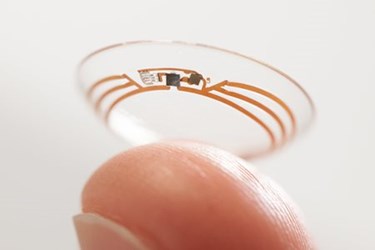Google, Novartis Smart Lens To Be Ready For Human Trials In 2016
By Jof Enriquez,
Follow me on Twitter @jofenriq

A "smart" contact lens being co-developed by Google and Novartis reportedly will be ready for human trials by 2016. The two companies are working together on next-generation contact lens technology that can be used in different treatment areas, including diabetes and presbyopia.
In a recent interview with Swiss newspaper Le Temps, Novartis chief executive Joe Jimenez said that the collaboration is "progressing well," according to Reuters. "I had said it would take about five years to see a product on the market," he reportedly told Le Temps. "The calendar is on track and we are already developing a technological lens prototype (that) should be tested on humans in 2016."
Reuters says a Novartis spokesperson told the news outlet that Jimenez was talking about a specific smart lens "for accommodative vision correction in people with presbyopia, or age-related long sightedness, who can no longer read without glasses."
When Google and Novartis announced their joint project last year, Novartis representatives had said that the two companies will focus on two primary applications for their smart lenses: one to correct vision for those living with presbyopia who can no longer read, and another to monitor glucose levels via the tears of diabetics.
The smart lens for those with presbyopia has a combination of miniaturized sensors and microchips that restore the eye’s natural ability to autofocus on nearby objects through accommodative vision correction.
The smart lens for diabetics consists of non-invasive glucose sensors, microchips, and miniaturized electronics to measure glucose levels in the wearer’s tears, with the capability to transmit data to a wireless device.
According to statistics from the United States Centers for Disease Control and Prevention (CDC), 9.3 percent of the U.S. population, or 29.1 million people, have either diagnosed and undiagnosed diabetes. Globally, the number of people living with diabetes has reached 387 million, according to the International Diabetes Federation.
As it represents a huge market, Google, whose Life Sciences division recently became independent, is keen on partnering with medical device manufacturers and pharmaceutical firms to develop diabetes-related devices.
Life Sciences announced previously a partnership with Dexcom to develop bandage-sized, cloud-connected continuous glucose monitoring (CGM) systems. It also recently unveiled a joint effort with leading insulin maker Sanofi to develop next-generation diabetes management devices and software.
Smaller players optimistic about the diabetes market are also developing their own glucose sensing technology. One startup, Medella, says they are offering a longer-lasting contact lens containing a biosensor that can communicate with a device attached to a collar or necklace, and then wirelessly to a smart phone. The company says their device requires less calibration compared to similar devices under development.
